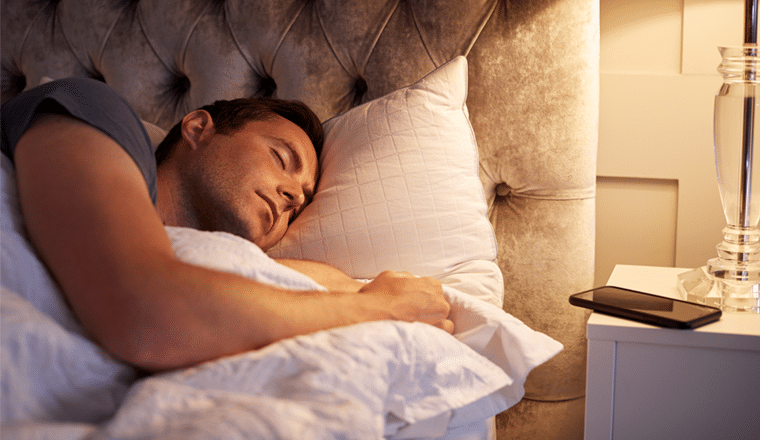
Whether it’s trouble falling asleep, staying asleep, or simply waking up feeling unrested, many people today struggle with sleep. Unfortunately, many factors in the modern world have made getting the right amount and quality of sleep harder to come by. Poor diet, high stress, and late-night phone and tech usage are some of the main factors that cause us to be wide awake when we should be asleep and recharging.
Fortunately, there are many things you can do to improve your sleep, without resorting to potentially harmful or addictive medications and drugs. In this article, we go over the top tips to improve your sleep quality, including meditation, sleep hygiene practices, and evidence-based sleep supplements.
The Current Sleep Issues Plaguing Modern Society
Sleep seems much harder to come by today than in years prior. In fact, about one-third of the total population fails to get the proper amount of sleep each night, and millions of people struggle with falling and/or staying asleep.
There are many factors that can cause sleep issues, but some of the main ones are:
- Poor nutrition: This can lead to deficiencies in many micronutrients that support sleep, such as magnesium, vitamin B6, and vitamin D.
- High stress: Increases cortisol levels and makes it hard to wind down and relax. Often leads to difficulty falling and staying asleep.
- Heavy tech use: Phones, laptops, TVs, and other tech devices are not only mentally stimulating, they also emit blue light, which can disrupt melatonin production and sleep-wake rhythms.
- Use of stimulants, such as caffeine and nicotine. These increase alertness and disrupt sleep quality.
- Alcohol use: While alcohol may help you relax and drift off more easily, it disrupts sleep quality, leaving you unrefreshed.
- Suboptimal sleep environment: Many individuals have to deal with noise, light, or uncomfortable temperatures, which can disrupt sleep.
- Lack of physical activity: Decreases overall health and, in general, is associated with worsened sleep quality.
How Much Sleep Do We Need?
The amount of sleep you need depends on your age, gender, and overall demands during the day. Most adults require between 7 and 9 hours of sleep per night for optimal health. Women seem to need just a little bit more sleep than men on average (about 11 minutes).
Tips to Naturally Improve Your Sleep
Natural solutions for sleep are becoming increasingly important as more and more individuals are looking to stay away from prescription medications and other drugs, which often come with a risk of side effects and dependence.
And when it comes to natural solutions, a great place to start is your lifestyle and daily habits. These are often overlooked, but have a significant influence on your ability to fall asleep and achieve high-quality rest each night.
Try implementing the following tips for better, more restorative sleep:
- Maintain a normal sleep/wake schedule. i.e. try to go to bed and wake up at the same time each day. (Yes, even on weekends!)
- Sleep in a cool, dark, and quiet room.
- To help achieve this, you can use a sleep mask, earplugs, fan/noise machine, blackout curtains, and/or temperature control, depending on your exact needs.
- Avoid anything too close to bedtime that may disrupt sleep, such as:
- Intense exercise
- Alcohol, nicotine, and caffeine
- Large meals
- Screen time/blue light exposure
- Work-related tasks or anything mentally stressful
- Engage in a relaxing routine, such as yoga, reading under soft light, deep breathing, or a sleep meditation.
- Limit naps to 20 minutes or avoid altogether, especially in the late afternoon or evening
Nutrition and Sleep
Nutrition also has a big impact on sleep quality. To harness the power of nutrition for better sleep, try implementing the following tips:
- Consume a well-balanced diet with emphasis on fruits, vegetables, whole grains, healthy fats, and lean proteins. This provides the body with numerous nutrients that promote better sleep and better health in general.
- Make sure to avoid fatty, spicy, sugary, and junk foods, especially at night. These can cause various issues, such as acid reflux, blood sugar dysregulation, and general discomfort.
In addition, certain foods and herbs may have sleep-promoting properties due to the presence of specific nutrients. Some top foods and herbs for sleep are:
- Almonds: rich in B vitamins and magnesium for sleep and relaxation support
- Tart cherry juice: contains natural melatonin (a crucial hormone for sleep/wake regulation)
- Kiwi: contains serotonin for mood and relaxation
- Chamomile, lemon balm, and passionflower: all of these herbs increase GABA in the brain, which has a calming effect
- Bananas: good source of magnesium (the relaxing mineral)
- Milk and dairy products: high in tryptophan, which supports serotonin and melatonin, as well as calcium for mood and stress.
- Fatty fish (e.g. salmon): High in vitamin D and omega-3s, which in general support sleep and overall wellness
- Ashwagandha: This adaptogenic herb helps lower stress hormones to promote tranquility and better sleep quality
Top Supplements for Better Sleep
In addition to lifestyle and nutrition, there are many sleep supplements available from Simply Nutrients that offer additional natural sleep support. Sleep supplements can help with sleep in various ways, such as by reducing stress, promoting calming brain chemicals, or supporting sleep quality.
If you’re unsure about which supplements or ingredients are best for your individual needs, you’ll want to check out our article, “Which Sleep Aid is Right for Me?,” for more clarity.
Some of the best supplements for sleep are:
- NutriDyn Magnesium Glycinate: NutriDyn offers high-quality vitamins, minerals, and other natural health supplements. Their Magnesium Glycinate formula offers 260 mg of magnesium per serving for potent stress and sleep support, while also helping to relax your muscles. Plus, it’s in a chelated form for easier absorption and greater effectiveness.
- Integrative Therapeutics Cortisol Manager: Integrative Therapeutics is one of the most trusted health and wellness supplement brands, backed by clinicians. Cortisol Manager is formulated with ashwagandha, magnolia bark, L-theanine, and phosphatidylserine. This potent combo helps to lower cortisol and increase brain GABA production, which in turn supports less stress, mental calmness, and better sleep.
- Microbiome Labs ZenBiome Sleep: Microbiome Labs provides an evidence-based lineup of gut health and general wellness products. ZenBiome Sleep offers a specific probiotic strain known to support the gut-brain axis, which is crucial for stress management and quality sleep. Plus, they add in theanine and lemon balm to promote a calm mind and deeper sleep.
- Pure Encapsulations Melatonin-SR: Pure Encapsulations offers numerous research-backed supplements for natural health promotion. Their Melatonin-SR formula includes 3mg of sustained-release melatonin to help you fall asleep and stay asleep throughout the night.
- If you’re curious about how melatonin may support sleep, be sure to check out the article about how to get more deep sleep on our Simply Nutrients website as well.
Sleep issues can be very frustrating and concerning. But by establishing healthy habits, practicing good nutrition, and utilizing sleep-supportive supplements, you can start to fall asleep more easily, sleep deeper throughout the night, and wake up feeling more energized and like your true self again, one night at a time!
FAQs
How does sleep meditation work?
Sleep meditations can vary depending on the type used. In general, they all focus on helping to center your mind in the present moment, while relaxing your mind and body. For example, you may focus on the rise and fall of your breath, use guided imagery, or conduct a body scan. You can do sleep meditations on your own, or through guided meditation via apps or online videos.
Are sleep masks good for you?
Yes, sleep masks can be good for sleep, especially if your room has a lot of light. Sleep masks can block various artificial light sources at night (e.g. street lights, appliance lights), which in turn may support healthier melatonin production and sleep quality.
How do you fall asleep fast?
To fall asleep fast, you need to be in a state of mental and physical calmness. All of the lifestyle practices and habits mentioned in this article will help do that. For additional support, you can consider relaxing supplements, such as theanine, chamomile, and magnesium, as well as specific breathing techniques, such as 4-6-8. Also, it’s important to remember that the natural time it takes to fall asleep is 15 to 20 minutes. Trying to force it sooner than this may backfire.
- Cold and Flu Season Survival Guide: Practical Tips for Busy Families - November 24, 2025
- Stress, Sleep, and Digestion Support Tips for the Holidays - October 30, 2025
- What Essential Oils are Ideal for a Healthier Home? - October 22, 2025
* These statements have not been evaluated by the Food and Drug Administration. The products mentioned are not intended to diagnose, treat, cure, or prevent any disease.


